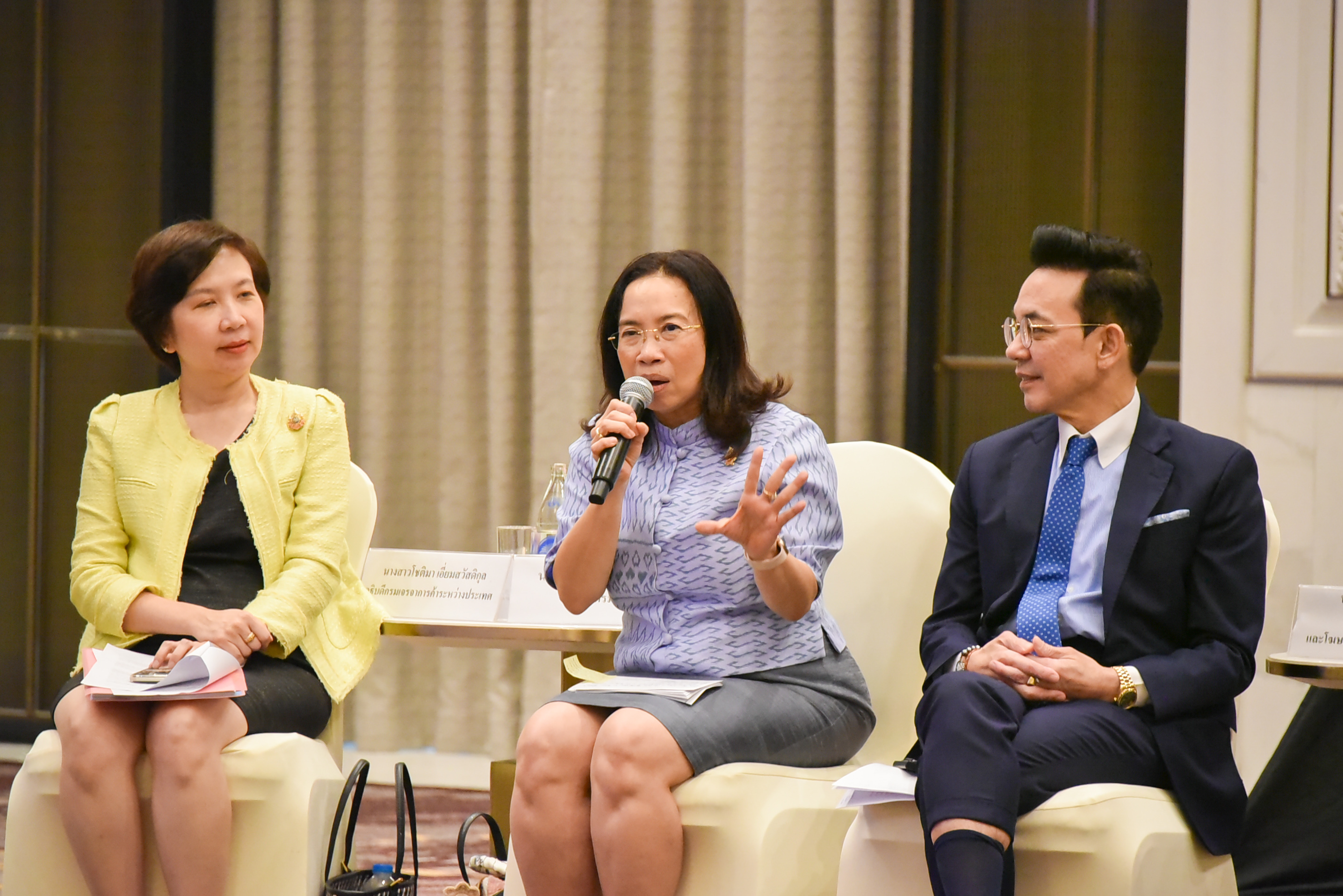อธิบดีกรมยุโรปร่วมบรรยายในงานเสวนาโต๊ะกลมเรื่อง “ก้าวสู่สัมพันธ์ไทย – EU ยุคใหม่: ไทยจะได้อะไรภายใต้ PCA”
อธิบดีกรมยุโรปร่วมบรรยายในงานเสวนาโต๊ะกลมเรื่อง “ก้าวสู่สัมพันธ์ไทย – EU ยุคใหม่: ไทยจะได้อะไรภายใต้ PCA”
วันที่นำเข้าข้อมูล 31 ต.ค. 2567
วันที่ปรับปรุงข้อมูล 1 พ.ย. 2567

เมื่อวันที่ 18 ตุลาคม 2567 นางครองขนิษฐ รักษ์เจริญ อธิบดีกรมยุโรป ได้ร่วมเป็นวิทยากรในงานเสวนาโต๊ะกลมหัวข้อ “ก้าวสู่สัมพันธ์ไทย – EU ยุคใหม่: ไทยจะได้อะไรภายใต้ PCA” ณ โรงแรมอีสติน แกรนด์ พญาไท โดยอธิบดีกรมยุโรปได้กล่าวเกี่ยวกับ “ความสัมพันธ์ไทย – EU ยุคใหม่ และประโยชน์จากการจัดทำ PCA” ซึ่งจัดโดยกรมสารนิเทศและเนชั่นกรุ๊ป ทั้งนี้ ในงานเสวนาฯ มีผู้เข้าร่วมเป็นวิทยากรประกอบด้วยอธิบดีกรมเจรจาการค้าระหว่างประเทศ รองประธานสภาอุตสาหกรรมแห่งประเทศไทยและผู้อำนวยการศูนย์ยุโรปศึกษาแห่งจุฬาลงกรณ์มหาวิทยาลัย และมีผู้เข้าร่วมงานเสวนาฯ จากภาครัฐ ภาคประชาสังคม ภาคเอกชน และภาคสื่อมวลชน กว่า 70 คน
กรอบความตกลงว่าด้วยความเป็นหุ้นส่วนและความร่วมมือรอบด้านระหว่างไทย-สหภาพยุโรป (Comprehensive Partnership and Cooperation Agreement: PCA) เป็นกรอบความตกลงที่ไทยจัดทำกับสหภาพยุโรป เพื่อกำหนดทิศทางความสัมพันธ์และความร่วมมือระหว่างกันในระยะยาวบนพื้นฐานของผลประโยชน์และค่านิยมที่ทั้งไทยและสหภาพยุโรปมีร่วมกันแบบรอบด้านครอบคลุมทุกมิติ ทั้งด้านการเมืองความมั่นคง ด้านเศรษฐกิจ การค้า การลงทุน และด้านสังคม เทคโนโลยี และสิ่งแวดล้อม โดยรัฐสภาไทย ได้มีมติด้วยคะแนน 612 จาก 614 เสียง เห็นชอบกรอบความตกลง PCA เมื่อวันที่ 29 สิงหาคม 2567ทั้งนี้ กรอบความตกลง PCA มีผลใช้บังคับไปพลางก่อน (ซึ่งเป็นสาขาความร่วมมือในส่วนที่อยู่ในอำนาจที่สหภาพยุโรปมีเหนือรัฐสมาชิก) เมื่อวันที่ 20 ตุลาคม 2567
ในงานเสวนาฯ ดังกล่าว อธิบดีกรมยุโรปได้กล่าวถึงความสำคัญของกรอบความตกลง PCA ว่าเป็นการยกระดับความสัมพันธ์ระหว่างไทยกับสหภาพยุโรป รวมถึงยกสถานะไทยในฐานะประเทศที่มีความคิดคล้ายคลึงกัน (like-minded countries) และเป็นหุ้นส่วนที่เท่าเทียมกับสหภาพยุโรป ท่ามกลางความท้าทายต่าง ๆ ในบริบทโลกปัจจุบัน โดย PCA จะช่วยให้เรียนรู้จากสหภาพยุโรปผ่านการแลกเปลี่ยนแนวปฏิบัติที่ดี ส่งเสริมความร่วมมือในการหารือทวิภาคี และเสริมสร้างขีดความสามารถในการแข่งขัน ตลอดจนเป็นกลไกที่จะส่งเสริมการผลักดันผลประโยชน์ของไทยในประเด็นต่าง ๆ อาทิ การสนับสนุนบทบาททางการเมืองระหว่างกันในระดับภูมิภาคและเวทีโลก การสนับสนุนการพัฒนาเศรษฐกิจของไทยผ่านการแลกเปลี่ยนข้อมูลและร่วมมือกันในด้านการส่งเสริมมาตรฐานและด้านการอำนวยความสะดวกทางการค้า การยกระดับความร่วมมือด้านการศึกษา วิทยาศาสตร์ เทคโนโลยี และนวัตกรรมระหว่างไทยและอียูผ่านโครงการ เช่น Horizon Europe และ Erasmus Mundus และการสนับสนุนการดำเนินงานตามแผนการขับเคลื่อนเป้าหมายการพัฒนาที่ยั่งยืนของไทย
นอกจากนี้ ผู้เข้าร่วมงานเสวนาฯ ได้แลกเปลี่ยนความเห็นว่า กรอบความตกลง PCA จะเป็นประโยชน์ต่อไทยในบริบทของภูมิรัฐศาสตร์โลกปัจจุบัน โดยเฉพาะอย่างยิ่งการผลักดันนโยบายสำคัญของไทย เช่น การเจรจาจัดทำ FTA ไทย – สหภาพยุโรป การขอยกเว้นการตรวจลงตราเข้าเขตเชงเกนของผู้ถือหนังสือเดินทางธรรมดาของไทย การส่งเสริมบทบาทของไทยในเวทีโลก เช่น การสมัครเป็นสมาชิกองค์การเพื่อความร่วมมือทางเศรษฐกิจและการพัฒนา (OECD) และคณะมนตรีสิทธิมนุษยชนแห่งสหประชาชาติ (UNHRC) ของไทย รวมทั้งในระดับภูมิภาค เช่น การส่งเสริมความสัมพันธ์ระหว่างอาเซียนกับสหภาพยุโรป
********************
Director-General of the Department of European Affairs participates as a speaker in roundtable discussion on 'Thailand-EU Relations: How will Thailand benefit from the Thailand - EU Comprehensive Partnership and Cooperation Agreement (PCA)?'
On 18 October 2024, Mrs. Krongkanit Rakcharoen, Director-General of the Department
of European Affairs, participated as a speaker at the roundtable discussion on 'Thailand-EU Relations: How will Thailand benefit from the Thailand - EU Comprehensive Partnership and Cooperation Agreement (PCA)?' organized by the Department of Information and the Nation Group at the Eastin Grand Hotel Phayathai. The Director-General of the Department of European Affairs discussed on the topic of a ‘New era of Thai-EU relations: the benefits of the PCA’. Speakers included the Director-General of the Department of Trade Negotiations, the Vice President of the Federation of Thai Industries, and the Director of the Center for European Studies at Chulalongkorn University. The event was attended by over 70 participants from the government, private, civil society, and media sectors.
The Comprehensive Partnership and Cooperation Agreement (PCA) is an agreement between Thailand and the European Union (EU) which sets the direction of long-term relations and cooperation based on the shared interests and values of Thailand and the EU in all dimensions, including politics and security, economics, trade and investment, social, technology, and the environment. The Thai parliament voted 612 out of 614 to approve the PCA on 29 August 2024. The PCA has been provisionally applied (in parts where the EU has jurisdiction over Member States) since 20 October 2024.
During the discussion, the Director-General emphasised the importance of the Thailand-EU PCA as a mechanism to elevate Thailand-EU relations, enhance Thailand’s status as a ‘like-minded country’, and render Thailand as EU's equal partner amidst current global challenges. Additionally, the PCA will enable Thailand to learn from the EU through the exchange of best practices to increase bilateral cooperation and enhance competitiveness. The PCA will also support Thailand’s interests in a number of ways, including enhancing political cooperation regionally and internationally, supporting economic development through cooperation and exchange of information to improve standards and facilitate trade, fostering cooperation on education, science, technology, and innovation through various initiatives, namely Erasmus Mundus and Horizon Europe, and supporting Thailand’s implementation of the Sustainable Development Goals.
Furthermore, participants exchanged views on the ways in which the PCA framework would benefit Thailand in the context of current global geopolitics, especially in pushing forward important Thai policies, such as the Thailand-EU FTA negotiations, Schengen visa exemption for Thai ordinary passport holders, and promoting Thailand’s roles on the global stage through supporting Thailand's bid for membership of the Organization of Economic and Cooperation Development (OECD)'s and the United Nations Human Rights Council (UNHRC) as well as on regionally by strengthening relations between ASEAN and the EU.
********************
รูปภาพประกอบ
รูปภาพประกอบ
Department of European Affairs
จันทร์ - ศุกร์ เวลา 08.30 - 16.30 น. (ยกเว้นวันหยุดและวันหยุดนักขัตฤกษ์)